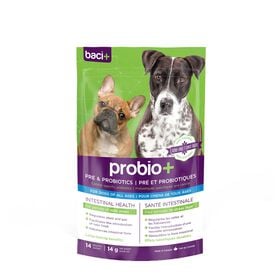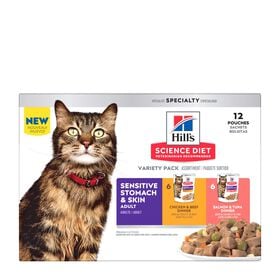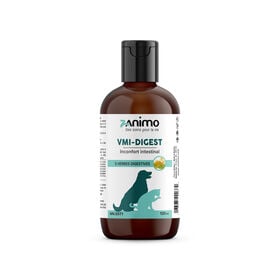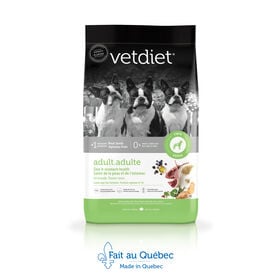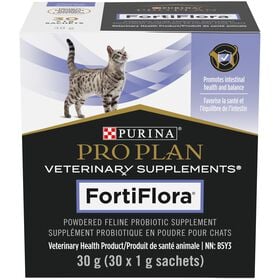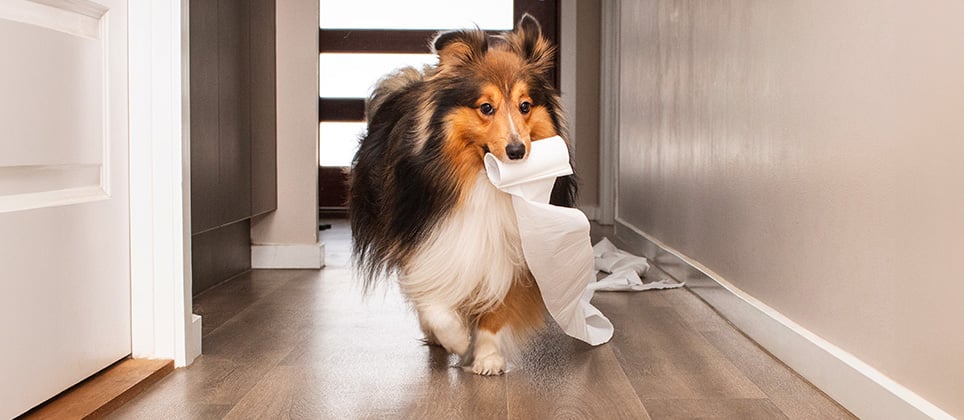
Diarrhea in pets: causes, symptoms, and how to provide relief at home
Published March 27, 2024.

Mondou Team
Pet well-being specialist
If you notice your dog or cat experiencing diarrhea, it's natural to be worried. To assist you in caring for your pet, let's explore the potential causes of diarrhea, when to seek advice from your veterinarian, and what you can do at home to alleviate your pet's discomfort.

What is diarrhea?
Diarrhea is a condition characterized by frequent bowel movements and a change in the consistency of stool, which may become more liquid in texture. It is often accompanied by a change in colour and odour and is generally caused by inflammation in the intestines.
Acute diarrhea typically occurs suddenly and lasts for only a few days. It is the most common form of diarrhea in pets. However, it can become chronic if the episodes keep recurring or last longer than two weeks.
What causes diarrhea?
If your pet is experiencing diarrhea, determining the possible cause can be useful in finding the most effective way to alleviate their discomfort. Identifying the underlying issue will enable you to take the necessary steps to help your pet feel better.
Dietary causes
- A change of diet: if you decide to change your pet's food, it's essential to transition over 7 to 10 days to allow their digestive system to get used to the new ingredients. Not doing this can lead to diarrhea problems.
- Ingestion of toxins: pets can ingest toxins from spoiled food, cleaning products, and certain plants, so keep these out of their reach.
- Food intolerance: Some pets may also have food intolerance, which means they cannot digest certain ingredients.
Also read: Switching your pet's diet: steps to a successful transition
Bacterial and parasitical causes
- Parasites: a stool analysis by a veterinarian can help identify the presence of parasites such as intestinal worms, coccidia, or giardiasis, which are some of the reasons why your pet may be suffering from diarrhea.
- A contaminated bowl: improper cleaning of eating bowls can result in diarrhea due to the formation of bacteria. Regularly washing your pet's bowls is essential to prevent the growth of harmful bacteria.
- Stress: it can also affect your pet's digestive system and lead to diarrhea.
- Infection: your pet may suffer from contagious gastroenteritis, which can spread through contact with another animal or in a contaminated environment.

Choosing the right diarrhea treatment
Chronic diarrhea in pets can sometimes signal an underlying health concern that requires prompt attention. Seeking guidance from a veterinarian is crucial in such cases, as they can recommend appropriate diagnostic tests and treatments tailored to your pet's specific condition.
On the other hand, acute diarrhea is common in pets and often resolves within a day or two without needing specific medical intervention. If your pet is in good overall health, try home treatment to alleviate their discomfort.
CAUTION: if your dog or cat displays signs of dehydration, vomiting, abdominal pain, bloody/black stools, or is very young or elderly, attempting home treatment is not advisable. In such instances, seek immediate veterinary assistance to ensure your beloved companion's proper care and well-being.
Guidelines for treating diarrhea at home
- If your pet is not experiencing vomiting, fasting is unnecessary. However, if vomiting occurs, it's advisable to fast them for 12 hours providing only water or rice water during this period. To prepare rice water, boil 1 cup of rice with 4 cups of water for 20 to 30 minutes until the mixture becomes milky. Reserve the rice for later use. Rice water can be offered freely to your pet whenever they have diarrhea.
- For pets experiencing digestive issues, transitioning to a more easily digestible diet is recommended. Your veterinarian may have specialized canned food available that can help. Alternatively, you can offer a mixture of 50% extra-lean ground beef or cooked chicken breast with 50% white rice. Avoid using any oils or spices. It's best to offer several small meals throughout the day to help your pet recover.
- Adding probiotics that are specifically formulated for pets can promote their digestive health. Over-the-counter pastes are also available to alleviate digestive discomfort in pets.
- After your pet has experienced 48 hours of regular bowel movements, you can gradually reintroduce their regular food. Start with 3 to 5 small meals per day, mixing their food with the lean meat and rice blend or specialized canned food. If your pet continues to experience diarrhea after 24 to 48 hours, or if they display signs of fever, agitation, or abdominal pain, consult your veterinarian. They can provide an accurate diagnosis and recommend appropriate treatment measures.
Also read: The ultimate guide to preventing and treating pet parasites

Special considerations for puppies and kittens
Due to the delicate nature of their digestive systems, puppies and kittens are more susceptible to diarrhea. Conducting a stool analysis is crucial to rule out the presence of parasites in young animals.
Additionally, it's highly recommended to promptly seek veterinary advice for young animals, as they have limited reserves compared to adult animals. This recommendation also applies to older animals, whose health may be more fragile.
By showering your furry companion with affection and attentive care, you can play a vital role in easing their discomfort and facilitating their speedy recovery.
This article was reviewed by Dr. Valérie Trudel, veterinarian and member of CABEA Mondou.
